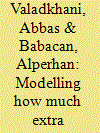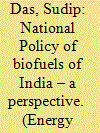| Srl | Item |
| 1 |
ID:
132653


|
|
|
|
|
| Publication |
2014.
|
| Summary/Abstract |
Gross profitability margin (difference between retail and wholesale prices) for unleaded petrol exhibits substantial variations across 108 cities, towns and regional centres in Australia. This paper examines if such variations (averaged during 2007-2012) can be explained by (a) transport costs proxied by the distance between retailers and wholesalers; (b) the size of the retail market; (c) market competition proxied by the number of cars in the vicinity of the retailers; (d) dummy variables capturing other qualitative attributes associated with the retailers' locations. Three cross-sectional regressions are estimated but only one successfully passes all diagnostic tests. By identifying a number of locations exhibiting excessive profit margins, the results of this paper enhance the efficiency and transparency of petrol pricing in the retail market. It is found that the extent of excessive profiteering in Western Australia (WA) and South Australia (SA) were lower than other Australian states and territories. This important finding can be explained by a strong presence of independent petrol stations in SA and the successful price-monitoring performance of FuelWatch in WA.
|
|
|
|
|
|
|
|
|
|
|
|
|
|
|
|
| 2 |
ID:
177491


|
|
|
|
|
| Summary/Abstract |
The National Policy on Biofuels (NPB) 2018 was adopted on May 16, 2018 in India to augment the generation of biofuels and to build a sustainable biofuel ecosystem. The Biodiesel Blending programme (BBP) got affected due to lack of sufficient feedstock coupled with an 18% Goods and Services Tax (GST) effective from July 1, 2017. The high GST resulted in the price of biodiesel being higher than that of conventional diesel thereby hindering the blending mandates. Most states in India do not allow free interstate movement of molasses resulting in artificially depressed prices besides derailing the Ethanol Blending Petrol (EBP) programme. NPB 2018 prohibits the import and export of biofuels to other nations resulting in reduced economic efficiency. The use of foodgrains as feedstock for biofuel production hampers food availability to the needy people and adversely affects food prices. The higher funding and incentives proposed to 2G ethanol production in NPB 2018 needs to be extended to 1G ethanol also as majority of the ethanol production happens through 1G. The paper touches upon the key biofuel policies of various nations, features of NPB 2018 and its critical analysis, BBP and EBP programmes and their current challenges and suggests future reforms.
|
|
|
|
|
|
|
|
|
|
|
|
|
|
|
|
| 3 |
ID:
177329


|
|
|
|
|
| Summary/Abstract |
Spanish premium oil operators have been accused of coordinating gasoline price cuts on Mondays. The objective of this practice, known as the “Monday effect” was to lower the official prices of automotive fuels - that was collected on Mondays - so as Spain was not at the top of the European price ranking. This behavior presumably ceased in May 2013 when Government began to consider the average prices of the entire week instead of Mondays prices. In order to test whether this anticompetitive behavior existed and ceased after the change in the data collection methodology, we employ a novel database that includes retail prices for all petrol stations in Spain in the period 2012–2013. Using a difference-in-difference estimator, we exploit this regulatory change to econometrically identify and confirm that: i) the three main companies, with 70% of the market share, have systematically established lower prices on Mondays, and that this is unjustified by either cost or demand; ii) this price reduction was small during 2012, but increased significantly in the first half of 2013. iii) following the change in the collection of price data by the government, the average Monday effect ‘disappeared’ from the Spanish gasoline market. Our results highlight the price coordination capacity of dominant oil operators in Spain and suggest that authorities that monitor cartels should be much more active in promoting competition in this sector, for example, by facilitating the entry of low-cost or independent stations and/or by being particularly alert to evidence of collusive behavior. Likewise, this coordination capacity must be taken into account when evaluating mergers in this sector and/or imposing fines.
|
|
|
|
|
|
|
|
|
|
|
|
|
|
|
|